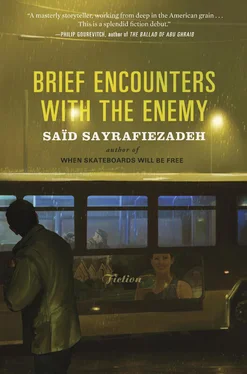“Who doesn’t love children?” I’d asked her. I was being snide, but the question had made her beam.
She obviously knew something about teaching, though, because the children weren’t behind in their lessons. That Monday morning I’d been surprised to walk into the classroom before school began and find the walls covered with drawings of the major figures of the Enlightenment. Spinoza. Locke. Newton. They were already on the Enlightenment.
On the floor beneath the drawings were cardboard dioramas in shoe boxes, a dozen or so dioramas featuring pivotal scenes from three centuries ago, like the apple hitting Newton on the head. I’d never done dioramas with my class. I’d never even considered them.
She’d also been conscientious enough to leave a detailed report on my desk, written in exquisite, outdated penmanship, informing me of each student’s strengths and weaknesses. “Ellery is shy, analytical, easily flustered. Mallory is contemplative, creative, and has allergies …” I didn’t bother to read the whole thing. My main concern was the prospect of having to rework my lesson plan, which had been handed to me six years earlier like a baton by the retiring history teacher, and which went only as far as 1959. “You won’t ever make it past 1910,” he’d sniggered. He’d been right till now. At the rate the students were going, they’d make it all the way to the present.
The day had started with such promise. I’d had butterflies coming around the bend, seeing the school in the early-morning light, two stories in red brick with a chimney. It was idyllic and beautiful, the school, in a run-down, affluent sort of way: drafty in the winter, hot in the summer, mice in the basement. It was surrounded by woods, a pond, and a baseball field, which had, when I’d driven up, six sprinklers going full force, trying to keep the grass green and lush. The school had been built one hundred years ago, when everything was corn and wheat. Since then it had produced three congressmen and one poet. Their portraits hung in the lunchroom as a reminder. “Give your best, get your best” was the school motto, etched above the main entrance. And that morning the principal, Dr. Dave, had been standing beneath the portico, waiting to greet me personally.
“Here comes the soldier-teacher!” he cried. He shook my hand vigorously. He looked me in the eye.
“I’m glad to be back, Dr. Dave,” I said. I wanted to sound easygoing, but I was ecstatic that he was taking time out of his day. He wasn’t much older than I, but he was more successful, and that always plagued me. It put my life’s accomplishments into perspective. He’d gotten his doctorate by twenty-six, he’d become principal by twenty-nine, he spoke Japanese. He wore jeans every day to prove that he was down-to-earth. He went by his first name, but with “Doctor” added for the constant evocation of academic achievement. The day I got the news of my call-up, he’d appeared unannounced in the teachers’ lounge and said a few impromptu words about “Jake’s decision to become a soldier,” ending with “Give your best, get your best.” I’d always found the phrase fatuous, but it had made me blush like a boy.
It was only seven-thirty and the students hadn’t arrived yet and everything was quiet. Dr. Dave escorted me down the hallway with his hand lightly on my arm. My arm felt muscular beneath his hand. Our footsteps echoed on the stone tile. Here comes the hero.
George the custodian was mopping the floor. He’d been mopping the floor for twenty-five years. When we passed, he stopped and said, “Welcome back, Mr. Mattingly.”
“I’m glad to be back, George,” I said.
“I prayed for you every day,” he said. He was being obsequious, and I liked it.
The typing teacher came out of her classroom and said, “Oh my God, Jake,” and hugged me. It was the first time a woman had touched me in eighteen months and I thought about resting my head on her shoulder. Her voice filled the hallway, which brought the spelling teacher out of her room, and the art teacher, and the English teacher. They all came running. Soon the hallway was filled with two dozen teachers and George, standing around waiting for me to regale them with war stories. I gave them platitudes. I told them it had been an honor and a privilege. I told them I’d do it again. They enjoyed the platitudes. They mistook the platitudes for details. Dr. Dave raised my arm like a boxer who’d won the championship.
But an hour minutes later I had fourteen boys and girls staring at me, wanting to know where Mrs. Tannehill was.
“Mrs. Tannehill was your substitute,” I informed them.
Their faces were blank. They didn’t understand. A substitute was someone who replaced the teacher. They had begun the year with Mrs. Tannehill, who was now being replaced. The seventh-graders before them had only ever known Mrs. Tannehill as well. As far as everyone in the near vicinity was concerned, I was the substitute.
The students sat in two rows of five and one row of four. They were the children of those who could afford prep school tuition — bankers, lawyers, doctors. They would grow up to be bankers, lawyers, doctors. This was the cycle and I was a part of it. They dressed in clean, pressed uniforms in the school colors of gold and black. The girls wore dresses, the boys wore ties. Their ties were gold or black. They might have appeared like well-behaved students, with their hands crossed, their pencils at the top of their desks, but their expressions were vindictive and mistrustful. They wanted me gone.
I explained to them that Mrs. Tannehill had been covering for me while I’d been “off fighting a war.” This was supposed to impress them, but it made no significant impact, even on the boys. It left me at a total loss as to what to say or do next. I’d been prepared for a rousing reception from these twelve-year-olds and now there was silence. Perhaps they thought I was inventing my military service. No doubt they’d grown accustomed to being lied to by adults. It would have helped if I’d been wounded in the line of duty, just a minor wound, something that had left a mark. I could have rolled up my sleeve and said, “This is where the bullet went in.” There was a soldier in my battalion who lost the tip of his pinkie finger. Brandon. It was only the tip and only the pinkie, and he’d done it while cleaning his gun one morning. He was an idiot, but it wasn’t a gruesome disfigurement, nor would it hinder him in life, and it was something he would forever be able to tell an unprompted story about. In lieu of my own wound, I thought about passing around my military ID, but that struck me as defeatist and emasculating. No, they wanted something tangible. They wanted the tip of my finger.
I tried a different angle. “Who here can tell me how the war ended?” Even as I said it, I could hear the honeycoated quality of my voice, pedantic and condescending. It was too late to take it back. I was talking down to them and they knew it, asking them a question that even a five-year-old could answer. Still, I waited, arms crossed in the pedagogical style, looking for someone to provide me the correct response, which, of course, was “We won.” This was the pivotal moment that I had studied in my teacher training courses; it was where I would gauge if the students respected my authority and viewed me as an educator. All I needed was one child, one out of fourteen, to give me the answer and I’d be able to move on organically to a discussion of what I’d been doing the last eighteen months. They would demand descriptions and I would give them descriptions. All the brutal descriptions their hearts desired. I’d hold nothing back and they’d be spellbound. Death by drowning, by burning, by whatever means available. That was how we had won the war.
Читать дальше












